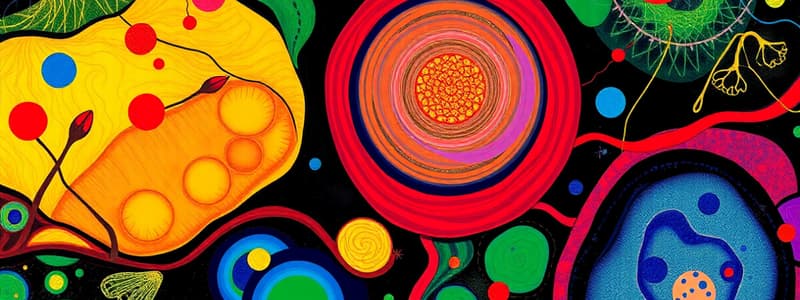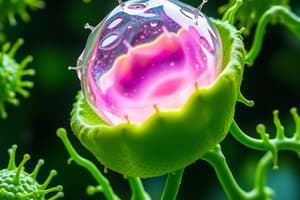Podcast
Questions and Answers
What is the basic unit of life according to cell theory?
What is the basic unit of life according to cell theory?
- Cell (correct)
- Tissue
- Organ
- Atom
Which of the following correctly describes homeostasis?
Which of the following correctly describes homeostasis?
- Change in genetic makeup over time
- Stable internal conditions despite external changes (correct)
- An increase in the size of an organism
- The study of cells at a molecular level
Which division of biology focuses on the study of microorganisms?
Which division of biology focuses on the study of microorganisms?
- Botany
- Zoology
- Microbiology (correct)
- Genetics
What molecule is primarily responsible for carrying genetic information?
What molecule is primarily responsible for carrying genetic information?
Which process do plants use to convert light energy into chemical energy?
Which process do plants use to convert light energy into chemical energy?
Natural selection is a key mechanism of which biological process?
Natural selection is a key mechanism of which biological process?
What is the primary function of carbohydrates in living organisms?
What is the primary function of carbohydrates in living organisms?
Which of the following is an incorrect statement regarding the biological hierarchy?
Which of the following is an incorrect statement regarding the biological hierarchy?
Flashcards are hidden until you start studying
Study Notes
Fundamental Concepts of Biology
- Definition: Biology is the scientific study of life, encompassing various fields that explore the structure, function, growth, evolution, distribution, and taxonomy of living organisms.
Major Themes in Biology
-
Cell Theory
- All living organisms are composed of cells.
- Cells are the basic unit of life.
- All cells arise from pre-existing cells.
-
Biological Hierarchy
- Levels of organization: atoms → molecules → cells → tissues → organs → systems → organisms → populations → communities → ecosystems → biosphere.
-
Homeostasis
- The ability of an organism to maintain stable internal conditions despite external changes.
-
Evolution
- Change in the genetic makeup of populations over time.
- Natural selection is a key mechanism of evolution.
-
Genetics
- Study of heredity and variation in organisms.
- DNA (deoxyribonucleic acid) carries genetic information.
Major Divisions of Biology
-
Botany
- Study of plants, including structure, properties, and biochemical processes.
-
Zoology
- Study of animals, including behavior, structure, physiology, and classification.
-
Microbiology
- Study of microorganisms (bacteria, viruses, fungi, etc.) and their impact on other living organisms and the ecosystem.
-
Ecology
- Study of the interactions between organisms and their environment.
-
Molecular Biology
- Study of biology at the molecular level, focusing on the structure and function of biomolecules.
Biological Processes
-
Photosynthesis
- Process by which plants and some organisms convert light energy into chemical energy (glucose) using sunlight, carbon dioxide, and water.
-
Cellular Respiration
- Process through which cells convert glucose and oxygen into energy (ATP), carbon dioxide, and water.
-
Reproduction
- Mechanisms for producing new individual organisms: asexual (single parent) and sexual (two parents).
Key Biological Molecules
-
Carbohydrates
- Sources of energy; include sugars and starches.
-
Proteins
- Made of amino acids; structural and functional roles in organisms.
-
Lipids
- Fats and oils; important for energy storage, cellular structure, and signaling.
-
Nucleic Acids
- DNA and RNA; involved in the storage and expression of genetic information.
Important Biological Theories
-
Germ Theory of Disease
- States that many diseases are caused by microorganisms.
-
Endosymbiotic Theory
- Suggests that eukaryotic cells evolved through symbiotic relationships between prokaryotic cells.
Biological Techniques
-
Microscopy
- Techniques for viewing small biological structures, such as cells and tissues.
-
Genetic Engineering
- Manipulation of an organism's DNA to achieve desired traits.
-
PCR (Polymerase Chain Reaction)
- Technique used to amplify specific DNA segments for analysis.
Conclusion
Biology encompasses a vast range of topics and concepts, all interconnected through the principles of life and the processes governing organisms and their interactions with the environment. Understanding these fundamentals is crucial for exploring more specialized areas within the biological sciences.
Studying That Suits You
Use AI to generate personalized quizzes and flashcards to suit your learning preferences.




